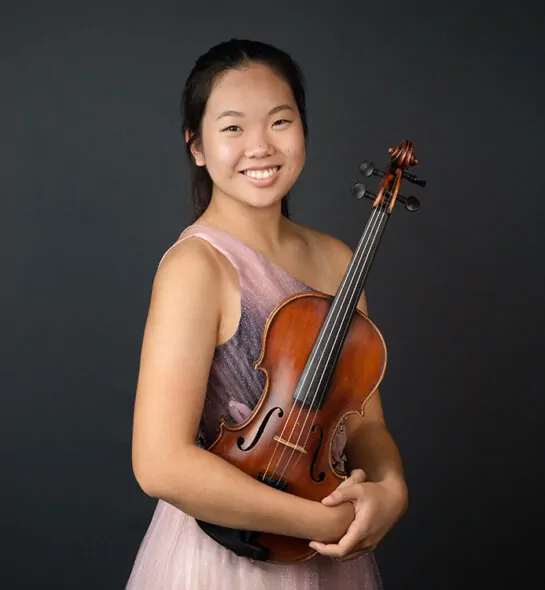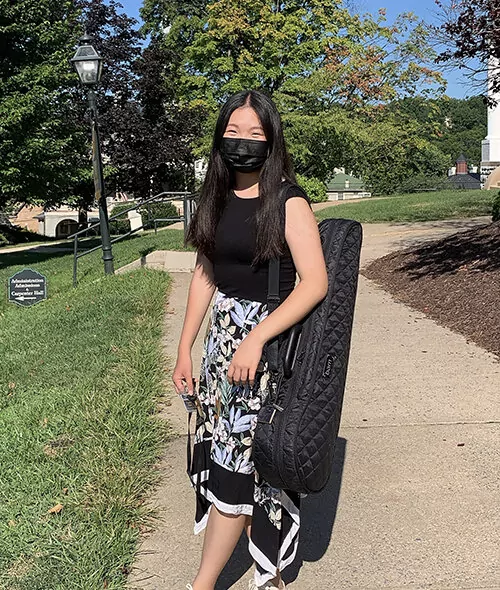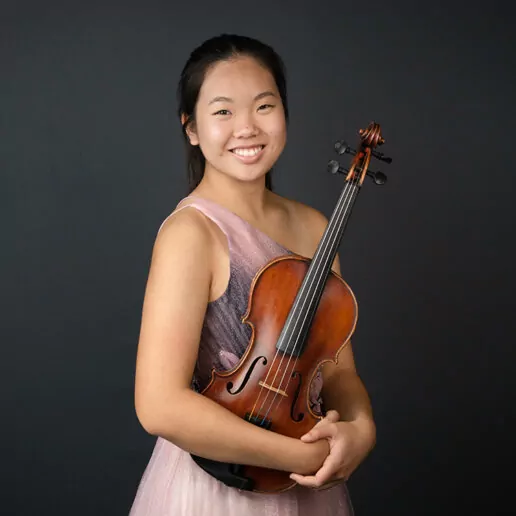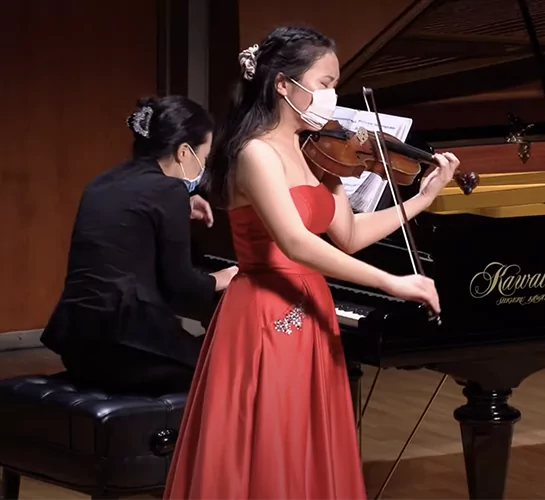Deeper Dive
While classical music is perhaps not the first avenue of recourse when solving world issues, its potential to encourage human connection on a larger scale is often overlooked—not without reason, given playing music has relatively few immediately obvious practical benefits. My project, “Songs Without Words: Using Classical Music to Promote Introspection and Connection,” involved the development of a basic framework for approaching classical music pieces in a way that encouraged greater audience participation and connection, with a focus on developing concrete stories and manipulating playing style accordingly. The portfolio I developed is essentially the culmination of years of study on several pieces that I view to be some of the most iconic in the repertoire: Poeme by Ernest Chausson, Fugue from J. S. Bach’s Solo Violin Sonata no. 1 in g minor, the first movement of Brahms Violin Concerto, the first movement of John Corigliano’s Sonata for Violin and Piano, and the Waxman arrangement of Bizet’s Carmen Fantasie. I selected them to range from extremely well-known with a fixed storyline (the Waxman and Chausson), to abstract (the Corigliano), as well as pieces in between. My work with these pieces and the ideas I developed in terms of approaching them is to establish a more audience-friendly approach to classical music, representing possibilities to increase its accessibility to audiences and potential uses in emotional therapy. I originally did not aim to embark on a project of this size and scope—I was actually looking for practice inspiration to stay focused and creative through the pandemic—but was inspired by my pandemic practice experimentation to create a body of work that aimed to provide a general audience with a more practical way to approach the sometimes intimidating scope of classical music.
In finishing my portfolio, I faced two major challenges: efficient time management to allow me to work on the project while fulfilling my other academic commitments and the technical proficiency required to fully examine the emotional scope of my repertoire. As a high school student taking many AP courses, I work through about three or four hours of homework a day; I also study at the Colburn Music Academy, which connotes several hours spent there after school and a ninety-minute commute three days a week. My work in competitive mathematics and chemistry takes up another 12 hours of my week. Consequently, I make sure to plan out my day in advance, practice as much as possible at Colburn, and make sure to make any “dead time” (i.e. time spent commuting, eating) as productive as possible. In terms of my playing itself, challenges originated from both the typical technical problems that arise during playing and the issue of staying faithful to the composer’s intentions while being creative and realizing my own ideas. I received considerable guidance on this from my teacher, Mr. Robert Lipsett, as well as my mentor, Miss. Aubree Oliverson, both of whom are affiliated with the Colburn School. I am very grateful also to my piano accompanists Hsin-I Huang, Alice Yoo, and Mitsuko Morikawa, who provided me with helpful input on creating a larger musical picture. Moreover, I am lucky to have received regular lessons and performance opportunities throughout the pandemic. While I believe my work would have benefited strongly from a more comprehensive survey of audience feedback (which was made impossible by the pandemic), I’m fortunate to be part of an extensive and close-knit network of musicians, including the From the Top and Heifetz Institute alumni communities, all of whom provided invaluable input.
Given the fast-paced nature of society today and the associated rising mental illness rates, opportunities for introspection and relaxation have become increasingly necessary. I hope that by considering my framework for approaching easily understood programmatic music and more abstract works, musicians will be able to find new avenues through which they can communicate with audiences more intimately and effectively. Furthermore, the creation and discussion of a concrete story behind a piece and creative alteration of playing style may foster greater interest in classical music in imaginative children and other audiences who might not understand or have the patience for it otherwise. Thus, on a larger scale, I believe that my work may help more unfamiliar audiences become acquainted with more obscure parts of classical repertoire, exposing a broader swath of people to the emotionally therapeutic possibilities presented by classical music.



